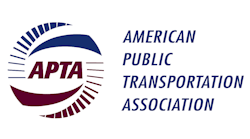Public transit industry still facing $39.3 billion shortfall through 2023
The transit industry has taken a severe blow during the COVID-19 health crisis. Facing the dual challenges of plummeting ridership and declining revenues along with the need to preserve service for essential trips, elected officials have worked to deliver a combined $39 billion in emergency relief in two separate packages. However, a new analysis by EBP US Inc. for the American Public Transportation Association (APTA) has determined this is nearly half of the industry’s projected shortfall of $39.3 billion through 2023.
The report states even with distribution of the COVID-19 vaccine commencing in December 2020, economic forecasts estimate pre-pandemic employment levels will not return until 2025. The report says this prolonged depression of the economy is expected to impact transit revenue through reduced ridership and reductions in other revenue sources.
Per the report:
"When the economy does begin to recover, transit agencies will still be challenged with severe fiscal constraints. Such constraints stem from physical distancing requirements that reduce vehicle capacity, increased costs of facility and vehicle cleaning and disinfection, and some displacement of ridership due to remote work options adopted during the pandemic being made permanent for many workers. For these reasons, assuming the economy recovers in line with current epidemiological projections and related long-run unemployment level forecasts, ongoing depressed transit revenue and expenses translates to annual funding shortfalls ranging between $13 billion and $15.1 billion per year for [calendar years] 2021 through 2023. "
Transit’s ask for additional funding
The Coronavirus Response and Relief Supplemental Appropriations Act of 2021 (CRRSAA) enacted in December 2020 provided $14 billion to the transit industry. Then, President-elect Joe Biden explained he viewed the funding provided in the CRRSAA to be a “first step and down payment on more action.”
Earlier this month, President Biden detailed the first of his two-step plan, the $1.9 trillion “American Rescue Plan.” The proposal includes $20 billion in relief for transit agencies. The details of which agencies may be eligible for the proposed funds and how they would be distributed should the proposal become law are still being developed.
While initial reactions to the proposal were positive, following the release of information in the EBP US Inc. report, APTA is requesting $39.3 billion in relief.
“The COVID-19 pandemic has put a spotlight on the importance of public transit in keeping our society working, moving, responding and connecting,” said APTA President and CEO Paul P. Skoutelas. “The pandemic represents an existential threat to public transit jobs, businesses and service. Our request for $39.3 billion is necessary to avoid catastrophic decisions that will hurt our riders, our communities and the nation.”
This month, APTA surveyed transit agency and business members to understand the potential impact should additional emergency relief not be provided.
On the agency side:
- Nearly four in 10 agencies are considering implementing further service cuts; nearly two-thirds of agencies cut service in 2020, but some of these cuts have been reversed;
- Nearly one of every four agencies may be forced to lay off employees; and
- Nearly one in three agencies have delayed, deferred or cancelled capital projects.
A survey of APTA business members found:
- On average, businesses experienced a 40 percent reduction in transit business with three in four businesses experiencing a reduction in activity;
- 32 percent of business had to lay off employees, 11 percent closed a facility and more than half have cut back on hiring; and
- One in five businesses are concerned they may close permanently due to the pandemic.
“Public transportation continues to be a lifeline during this challenging time. The industry serves essential employees every day, but without additional emergency funding, many transit agencies will need to further cut transit services and routes and lay off additional transit workers, leaving our communities without transportation and jobs when they need them most,” said Jeffrey A. Nelson, general manager, Rock Island County Metropolitan Mass Transit District (MetroLINK), Moline, Ill.
--------------------------
The EBP US Inc. report is available here.

Mischa Wanek-Libman | Group Editorial Director
Mischa Wanek-Libman is director of communications with Transdev North America. She has more than 20 years of experience working in the transportation industry covering construction projects, engineering challenges, transit and rail operations and best practices.
Wanek-Libman has held top editorial positions at freight rail and public transportation business-to-business publications including as editor-in-chief and editorial director of Mass Transit from 2018-2024. She has been recognized for editorial excellence through her individual work, as well as for collaborative content.
She is an active member of the American Public Transportation Association's Marketing and Communications Committee and served 14 years as a Board Observer on the National Railroad Construction and Maintenance Association (NRC) Board of Directors.
She is a graduate of Drake University in Des Moines, Iowa, where she earned a Bachelor of Arts degree in Journalism and Mass Communication.





